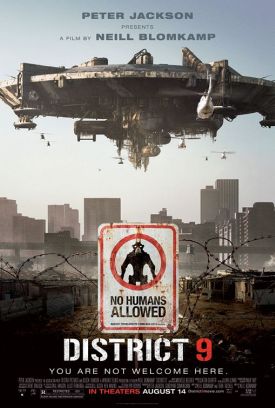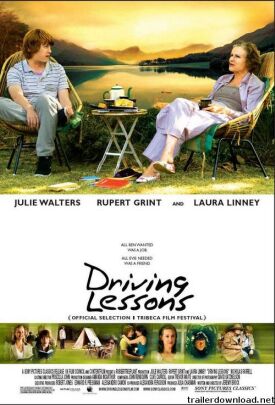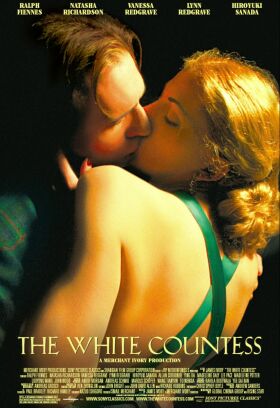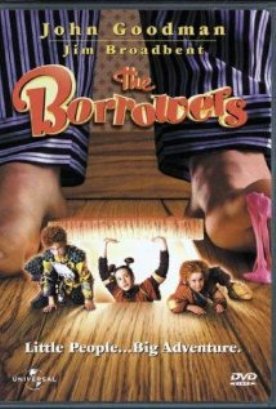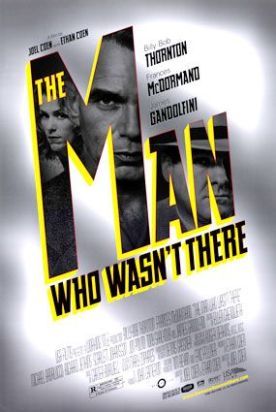District 9
It’s hard — well, a little bit hard — not to like District 9. This South African mockumentary by Neill Blomkamp manages to keep its audience awake through yet another alien invasion flick by making jokes at the expense of the American-o-centric popular culture — hitherto pretty much the only place where such invasions are known to exist — and by hinting at parallels from South African history. The solemn announcer who, at the beginning and for no good reason gives us the history of the alien presence, hovering above Johannesburg in a space ship so large that it looks like an inverted reflection of the city itself, can’t resist remarking on the surprise the thing occasioned by not appearing over New York or Washington instead. Isn’t that where aliens would naturally want to go? It’s in all the movies. But then it turns out that these aliens are immigrants, not invaders, and their outlandish appearance takes on a racial cast which swiftly results in a return to Apartheid.
As under Apartheid, too, there is no shortage of rationalizing intellectuals, many of whom are paraded before Mr Blomkamps’s cameras, to explain why these creatures, whom the movie’s humans refer to with the derogatory epithet “prawns” — “You can’t say they don’t look like that,” says one of Mr Blomkamp’s talking heads — don’t fit in with the rest of society and have to be fenced off in shanty towns that bear an uncomfortable resemblance to those still to be found in South Africa. Though the prawns come from what is obviously a much more technologically advanced society than our own, they are apparently all but helpless here on earth as they huddle in their pathetic shacks and trade whatever they can scrounge to Nigerian gangsters for cat food. One theorist explains their condition in a familiar way by opining that these prawns, found desperate and starving on the mother ship, are “basically the workers” who, inexplicably abandoned by their leaders, have no real intelligence or initiative of their own
At this distance of time from the bad old days, you’ve got to wonder quite what the point is in digging up the carcass of institutionalized racism — the real thing, as opposed to the hysterical fantasies of the race-relations industry in America or Europe — in order to have a few more shots at it. Is there widespread nostalgia in South Africa for segregation by racial classification? White-black-coloured-prawn? Possibly there is, but surely there can be no serious prospect of its return? Insofar as Mr Blomkamp’s movie is a satire, its target is by now much too uncontroversial and easy to attack to be very much worth attacking. That is presumably why the satirical allusions to Apartheid seem, at least at first, to be mostly decorative, lending a bit of atmosphere and local color, while the dramatic gravamen of the film moves on to a story of something not entirely unlike heroism.
This is the other thing that makes the movie almost rise above its comic book provenance to the level of a real movie where such American equivalents as Independence Day (1996) or Signs (2002), mired in their comic-book origins, do not. That, too, may have something to do with its non-American setting, which helps to create a certain sense of dislocation from comic-book land and provides a point of contact with the real world as well as the real world’s social and political problems. On the other hand, the absurdity of the mise-en-sc ne — which is deliberately exacerbated by such satirical touches as having the aliens look like giant crustaceans hardly adapted to the making and use of tools, let alone the piloting of space ships — is kept in something close to equipoise with the dramatic excitement of the hero’s exploits, instead of being allowed, quite, to overwhelm it.
This hero is Wikus Van De Merwe (Sharlto Copley), a clueless Afrikaaner bureaucrat who, through nepotism, is put in charge of a government scheme to relocate the aliens to a camp in the veldt, far from the city. “The people of Johannesburg are going to live happily knowing the prawns are very far away,” says Wikus cheerfully. In the process, however, he becomes contaminated with a prawn science project to manufacture the propellant (“the fluid”) which is required to get their giant space ship moving again, and this causes his DNA to change to the point where he gradually begins to metamorphose into a prawn himself. It’s ridiculous, I know, but the suspension of disbelief is less difficult than you might expect in the quasi-realistic circumstances. The fluid is a bit like the magic potion in a fairy tale that you can take on trust just because everything else isn’t magic as well.
Nor is that the only fairy-tale element. Wikus’s is a kind of male Cinderella story, like that of Gamelyn or Orlando in As You Like It, since he is the despised poor relation who rises above his misfortunes to become a hero. Starting out as one of the film’s bumptious talking heads — “The prawn doesn’t understand the concept of property,” he confidently informs the documentary audience — he learns to sympathize with the aliens’ plight and eventually joins with their leader in the desperate plot to escape from inhospitable earth. This means fighting against the authorities, including his overbearing father-in-law, who were once so patronizing towards him, and it casts him in the role of freedom-fighter according to a familiar narrative, lately of much potency in his homeland and throughout the continent. So that’s good, then, right? Because it takes us back to the satire? No, that’s bad, because the reminder of such serious things contrasts too jarringly with the silliness of everything else. But the movie almost had me going there — which, being stuck here in comic-book land, I consider no small accomplishment.
Discover more from James Bowman
Subscribe to get the latest posts to your email.

